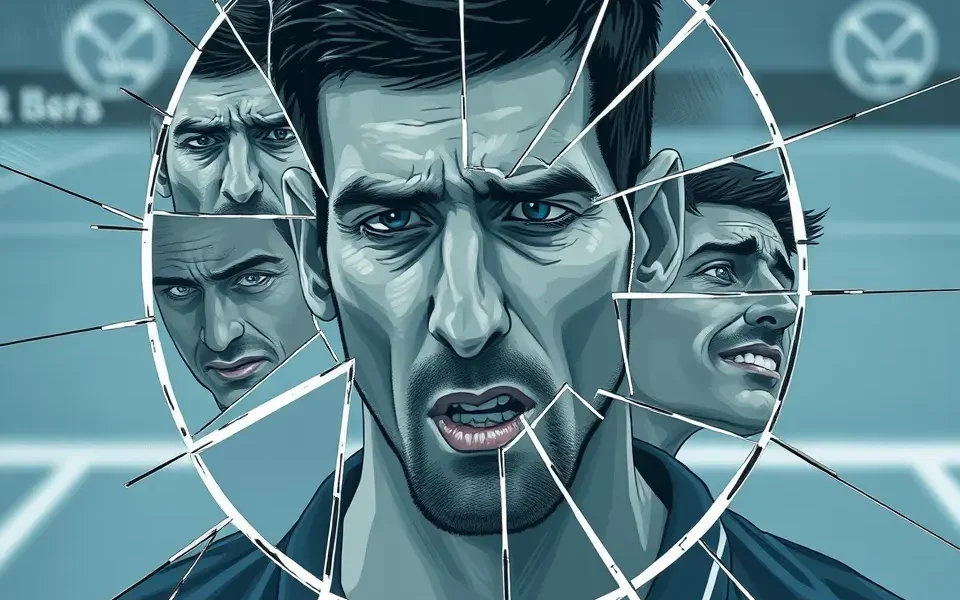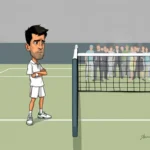Serena Williams’ former coach, Rennae Stubbs, has recently suggested that other players are beginning to realize that Novak Djokovic is no longer the invincible force he once was. This statement comes amidst a period of relative struggle for the Serbian tennis legend, sparking debate about his future dominance in the sport. As Djokovic approaches his 38th birthday in May, questions arise about whether age, injuries, or a shift in the mental landscape of his competitors are contributing to this perceived vulnerability.
The Shifting Sands: Djokovic’s Recent Performances
Djokovic, widely regarded as one of the greatest tennis players of all time, has experienced a dip in his performance compared to his dominant years. Since the start of last year, he has secured only one title, the Olympic gold medal, a feat that has long eluded him. However, his recent tournament results paint a less flattering picture.
- Early Exits: In 2025, Djokovic has participated in three events, suffering first-round exits in two of them. This includes a recent defeat at Indian Wells against Botic van de Zandschulp.
- Australian Open Semifinal Retirement: At the Australian Open, he retired in the semi-final match against Alexander Zverev due to a hamstring injury, raising concerns about his physical condition.
- Qatar Open Loss: He also suffered an early loss at the Qatar Open to Matteo Berrettini.
- Unforced Errors: Djokovic’s match against van de Zandschulp at Indian Wells saw him commit a notable 37 unforced errors, indicating struggles with his game.
These results have fueled speculation about Djokovic’s form and whether he can maintain his position at the top of men’s tennis.
The Psychological Edge: Has the Fear Factor Faded?
Rennae Stubbs believes a crucial factor in Djokovic’s perceived decline is the shift in the mental landscape. She argues that players are no longer as intimidated by him as they once were.
- Realization of Vulnerability: Stubbs suggests that players have started to realize that beating Djokovic is possible, diminishing the “mental victory” he once held over them.
- Age and Physicality: Stubbs believes Djokovic’s age is a contributing factor, making him “a little bit slower” and “a little bit more nervous” on the court.
- Maintaining Confidence: She emphasizes the importance of self-belief, stating that Djokovic needs to convince himself that he is still good enough to win.
Djokovic himself acknowledged struggles and the increasing difficulty of staying competitive after his loss at Indian Wells.
Mouratoglou’s Perspective: A Finite Reign?
Patrick Mouratoglou, Serena Williams’ former long-time coach, also weighed in on Djokovic’s future, expressing doubts about his longevity in the sport.
- Retirement Prediction: Mouratoglou believes Djokovic’s career will likely end before the age of 41, unlike Roger Federer.
- Motivation as a Key: He suggests that Djokovic’s motivation may not last for another four years, implying that his drive to compete at the highest level could diminish.
- Djokovic’s Dominance: Despite this prediction, Mouratoglou has consistently praised Djokovic, even considering him the greatest player of all time (GOAT). He highlights Djokovic’s exceptional physical condition and evolution as a player throughout his career.
Djokovic’s Mental Fortitude: A History of Overcoming Adversity
Djokovic’s career has been defined by his exceptional mental toughness. He has consistently demonstrated the ability to overcome adversity and perform under pressure.
- Mental Training: Djokovic recognized the importance of mental training early in his career, hiring Boris Becker to help develop his mental game.
- Breathing Exercises and Meditation: Djokovic emphasizes the importance of breathing exercises for mental toughness, believing they are key to understanding and improving mental, physical, and emotional well-being.
- Acknowledging Emotions: Djokovic admits to experiencing doubts and fears during matches, emphasizing the importance of acknowledging these emotions and bouncing back to the present moment.
- Using Past Struggles as Motivation: Djokovic’s mental strength is attributed to the challenges he faced growing up in Serbia during a time of war and crisis, fostering a “never give up spirit”.
Can Djokovic Adapt and Reclaim His Dominance?
The question now is whether Djokovic can adapt to the changing landscape of men’s tennis. He has already taken steps to rejuvenate his game, including hiring Andy Murray as his coach. Some potential strategies for prolonging his career include:
- Shortening Points: Prioritizing efficiency over endurance by shortening points.
- Selective Scheduling: Being more selective with his tournament schedule to conserve energy.
Ultimately, Djokovic’s ability to reinvent himself and maintain his mental fortitude will determine whether he can reclaim his dominance and continue to compete for major titles.








No Comment! Be the first one.